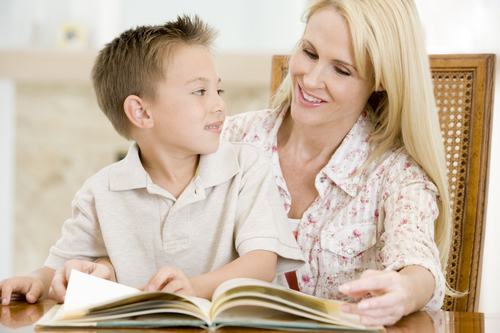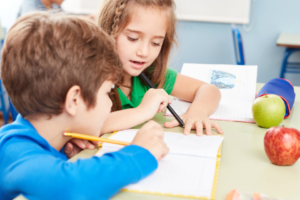
3 Ways to Promote Preschool Literacy at Home

The age old practice of teaching children the letters of the alphabet and the sounds they make (“B says buh”) is still relevant and important. As you know, letters make words, which make up spoken and written sentences. A child’s literacy journey is often a spiraling path. There are many fun ways that you can support them at home, and a few are listed below.
Develop Their Concept of Word
At first, the “concept of word” can sound both overly theoretical and obvious. But many kids at the preschool age do not know how to identify words and sentences on a page. One way to encourage this understanding, even with pre-readers, is to point to the words as you read to them, and to start a page by saying, “Wow, look at all these words!”
Reading Rockets tells us that working with the concept of word can offer children a variety of beneifts. It can “develop students’ alphabet knowledge, phonemic awareness, and knowledge of words in print.” The knowledge of words in print is also known as print awareness. You can sing a song while pointing to help them identify where words start and stop by finding the spaces between them. You can sing, “word, space, word, space, word, space.” Point out that the words are made up of alphabet letters that all have sounds. Again this can seem obvious or unnecessary, but it is a crucial connection between being read to and wanting to read that many children do not gain right away. You could say, “How many words are on this page?” and count them together (as well as how many letters are in each word). I also recommend introducing punctuation in a playful way. Be warned: I have known some children to become absolutely obsessed with ending every sentence they are read with an exclamation of, “Period!”
Display Sight Words
Sight words are words that can be identified and read on sight. If your child is a long way off from reading independently, this is perfectly normal! They can still start to develop an understanding of what words are (there’s that concept of word again) and recognize letter combinations in words as a partner activity to learning letters and letter sounds.
A good example of an early sight word is the word STOP on a stop sign, which becomes familiar to many children early on, especially those with an interest in transportation. You can tape labels like bed, door, and chair around your house. If they are in a school program, find out what letters or topics they are focusing on and use that to direct your sight word displays at home (label the milk clearly when they are learning the letter M).
Play Syllable Awareness Games
Being able to hear syllables heightens children’s phonological listening skills, or their ability to hear and make sounds. When they can more clearly hear and identify words and sounds, they are making gains in literacy. A great way to start any literacy activity is with children’s names, because they usually love their own names. You can clap out the syllables in their names by saying each name in a disjointed fashion so each syllable is heard (“Tom-my: That’s two!”).
A good way to introduce speech segmented by syllables is with a silly syllable puppet who always breaks words into syllables when talking. Later, when you are reading to them or singing together, stop and clap out the syllables in a random word. This is a literacy activity that gives them a sense of success and competence, and is fun.
A few extra tips: remember those old spelling monsters on Sesame Street? They put the two syllables or the beginning and ending sounds of a word together slowly, until it formed a whole. They are still a hit and are very effective. Accessible words that end with at and it are also great to focus on for early “sounding out” and literacy development (yes, Dr. Seuss had it right with The Cat in the Hat). Read to your children and talk with them. Above all, enjoy this precious era of your child’s literacy development, communicate with their teachers, and celebrate their growth.
Written by Julia Travers
Contact us today to learn more about how our tutors can help your child improve their literacy skills!
Tag:preschool




3 Comments
I’ll be using these tips. Always on the look out for teaching my son. Thank you.
These are some great ideas. We read every day (multiple times) with our son, but I love the idea of encouraging the recognition of words. We’ll have to had some of this to our reading time.
Wonderful, I’m so glad this was helpful! :)